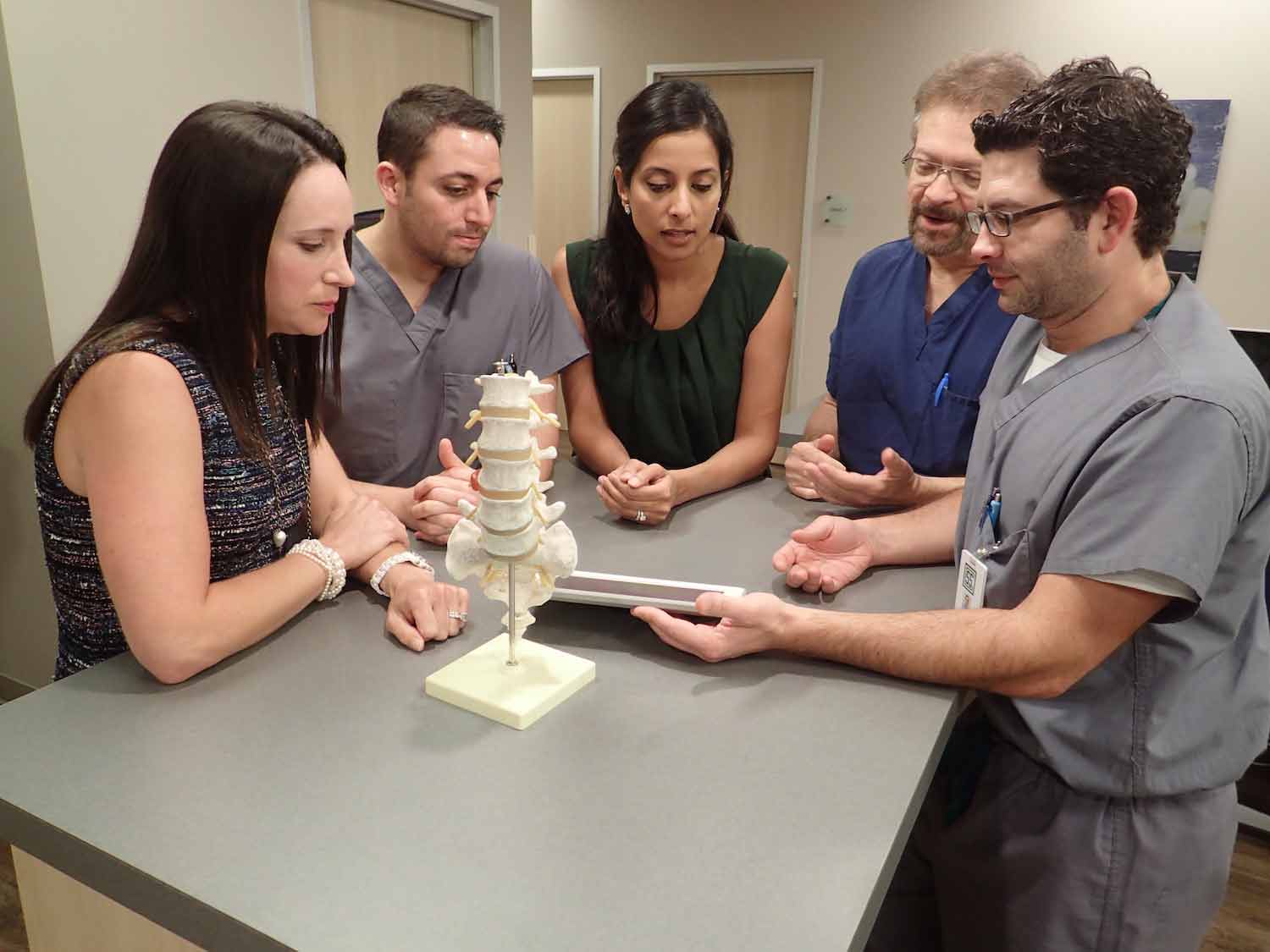What is a Pain Management Physician?
Millions of Americans everyday suffer from severe, acute or chronic pain for a variety of reasons. While some of them are able to get rid of their pain by undertaking physical therapy or through the use of over-the-counter remedies, for many, the pain continues without end. That’s when it’s important to have a specialized physician who knows how to treat chronic pain.
Pain management physicians or doctors are focused on helping you find ways to deal with these different types of pain. They are specially trained to perform minimally invasive advanced procedures to help diagnose and treat chronic pain conditions. Our goal is that your quality of life will improve so that you can go about doing the things you enjoy once more.
At Capitol Pain Institute we understand that no one should have to live with pain every day of their lives, and we work hard to provide treatments for our patients that will give them the ability to do the things they love again. We currently service patients in Texas, Kentucky, and Ohio.

What is Pain Management?
To understand the role of a pain management physician, it’s good to first understand what pain management is. Pain management is a specialized branch of medicine that focuses on the treatment of pain whether it be acute, minor, severe, or chronic. Patients can experience pain from a long list of different sources and so it is important to have a way to help them deal with that pain in whatever form it takes.
Although pain management is a specialized branch of medicine, it does not focus on a single approach to treating pain, but instead there are a range of treatments available to deal with all the different types of pain. This helps to give patients options when it comes to how they deal with their pain.
Types of Pain Management
Unfortunately, pain management and pain management clinics have gotten a bad reputation as places that only dispense prescription pain medications. While prescription medications are sometimes used to help manage chronic pain, that is far from what a true pain management physician and their team actually does for patients. As mentioned, pain management covers a wide array of treatments and a true pain management physician will help you find the right one for your unique situation.
Here are some examples of the different types of pain management treatments that are available.
Bracing
Bracing is the practice of providing supportive equipment to help offload painful areas of the body or to provide assistance with movement of the affected area.
Joint Injections
There are various joints throughout the body that can be the source of chronic and radiating pain. Joint injections may be used to diagnose pain and find the source of it so that other treatments can be prescribed.
Steroid Injections
Steroid injections are a more targeted type of injection that uses corticosteroids to provide pain relief to a specific area of the body. They can be used in many different parts of the body for different types and causes of pain.
Trigger Point Injections
A trigger point injection is generally indicated to treat painful areas of muscle or knots of muscle that can form in any muscle of the body. During this injection, medication is placed into the trigger point to help alleviate the localized pain, as well as the referred pain from this trigger point. The medication injected is generally a combination of steroids and anesthetics.
Stem Cell Therapy
Adult stem cells are derived from the patient’s bone marrow. Next, a unique solution containing platelet-rich plasma and the harvested stem cells is created and then injected into problematic regions such as degenerated joints, ligaments, herniated discs, muscles, etc. These stem cells circulate throughout the body and play an integral part in regenerating and thus healing tissues at the cellular level.
NSAIDS and Medication Management
Pain management physicians may prescribe specific medications in combination with over the counter drugs and other treatments to help manage ongoing pain for patients that either cannot find relief through other treatment options or do not wish to undergo more serious treatments for the management of their pain.
Who Can Benefit From Pain Management?
Anyone with pain can benefit from the services of a pain management physician, but there are certain types of injuries and specific conditions which benefit more from pain management than others. Some treatments are used to isolate and diagnose pain, while others are used solely to relieve and manage the pain from the source once it is found.
Arthritis, Back Pain, and Joint Pain
Some of the most severe sufferers of chronic pain are those with arthritis and pain related to the spinal column or the joints. As such, many of the treatments that are available through pain management are focused on the specific areas of the body that these types of pain stem from.
Headaches
Headaches affect millions of people and whether they are migraines or cluster headaches the pain associated with them can be acute and unbearable, making even routine daily tasks impossible. Those suffering from migraines and headaches can benefit from a pain management physician treatment plan
Chronic Pain Disorders
Some people develop conditions that lead to widespread pain throughout regions of the body or the entire body. Conditions like fibromyalgia and complex regional pain syndrome afflict large numbers of people and there are only limited treatment options for these conditions, which leads to many seeking assistance from a pain management physician to deal with the ongoing pain.
Neuropathy
Neuropathy is damage to a nerve that can result in various sensory or motor afflictions, depending on which nerves are injured. The damaged nerve can cause pain, stinging, and tingling to various parts of the body, muscle cramps, general weakness, or atrophy. With such a wide range of potential issues, expert diagnosis is required in order to properly treat neuropathy. Pain management physicians can identify the type of neuropathy and create a treatment plan that will help reduce the pain, and ideally lead to significant improvement in the patient’s quality of life.
What is the Role of a Pain Management Physician in Treating Your Pain?

Pain management is much more than providing medication and issuing prescription refills. A pain management physician handles the vast majority of the details related to your treatment, working with you on your specific issue in order to provide the best care possible. Pain management at its core is a multi-layered approach to treatment and requires a knowledgeable expert to handle the intricacies of your pain.
One of the most important parts of the process that is handled by your pain management physician is an evaluation of your overall health and the pain you are experiencing. A proper evaluation is important because no two patients are the same and what works for one patient may not work for another.
Your physician has to take into account a whole range of factors when determining what treatment to prescribe. Some patients may have health conditions, allergies, or other complications that could prohibit a particular type of treatment from working.
Once your pain management physician has finished with the evaluation of your specific case, the next step is to work with you to develop an effective treatment plan that works to not only help manage your pain, but to reach your goals in terms of how you would like treatment to progress.
Treatment plans carefully combine a mix of therapies, exercise, medication management, potential surgeries and other options to create a program that is not only effective and easy for patients to follow, but hopefully improves their quality of life as well so that the effects of pain aren’t as impactful on the patient’s day to day life.
Your pain management physician is also responsible for monitoring your progress and adjusting your treatment as necessary as symptoms and conditions change. This means checking in with you on a regular basis to see if new symptoms have arisen, if medication and treatment is working properly and if goals and needs are being met.
When it comes to dealing with any type of pain, your pain management physician is your most important resource and your first line of defense. If you live in either Texas, Kentucky, or Ohio and are concerned about your pain, contact us at Capitol Pain Institute today!
Pain Management Physicians are specialized doctors whose focus is on evaluating, diagnosing and treating patients' pain symptoms through a wide variety of methods.

